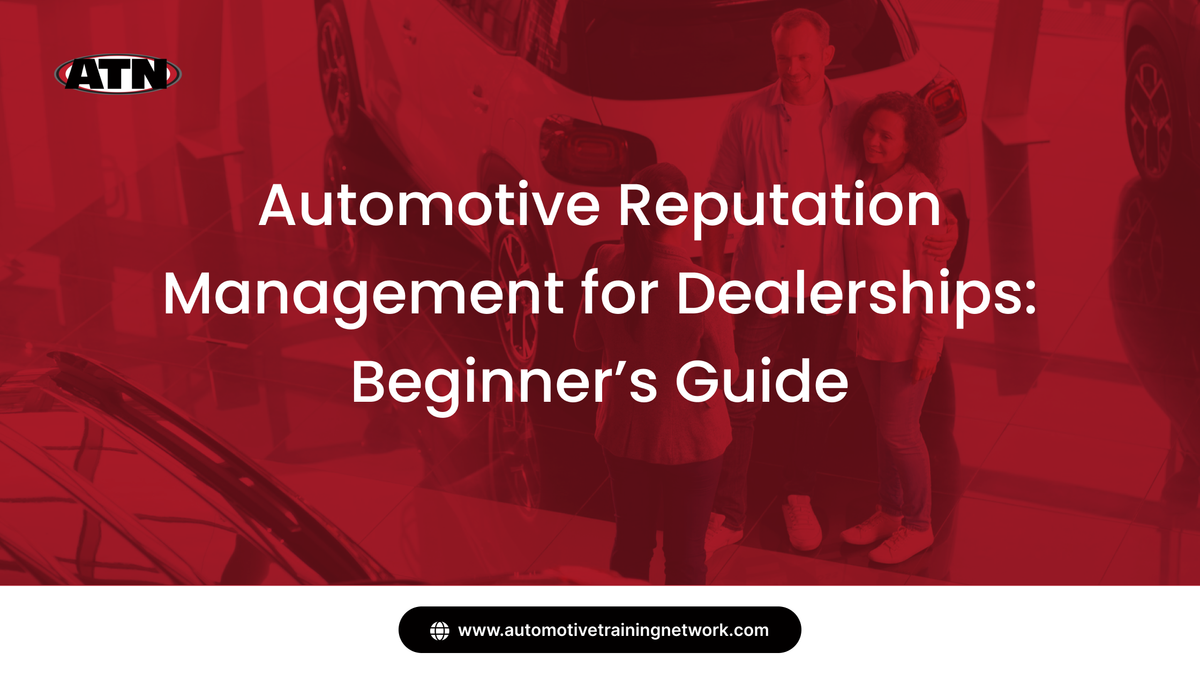Automotive Reputation Management for Dealerships: Beginner’s Guide

Potential buyers are excited about finding their next or a new car and stumble upon your dealership's online listing. Before visiting, they are bound to dive into the reviews. What they read in those comments can either drive them through your doors or send them searching elsewhere. This underscores just how crucial a strong, positive online reputation is.
Are you willing to take a bet without reading a review for such a significant investment, assuming a clear no?
Today’s customers have a wealth of information, with online reviews and ratings often serving as the final word in their purchasing decisions.
In this blog, you’ll discover proven strategies for automotive reputation management. These strategies ensure every customer interaction leaves a lasting positive impression on your dealership business.
Automotive Dealerships of the Future: Bridging the Gap
Your dealership's online presence is a first impression for potential customers in today's fast-forward lifestyle. Before visiting, customers will explore a dealership's social media activity, website, and reviews. This online reputation reflects the dealership's commitment to providing a positive customer experience.
Your Reputation is a Digital Currency
Managing a dealership's online reputation can initially seem like a significant undertaking. Outdated social media content or negative reviews are concerns.
However, negative feedback shouldn't be a cause for alarm. Implementing a strategic plan can generate a steady stream of positive reviews, ensuring the online presence accurately reflects the exceptional dealership it is.
Introduction of Reputation Management
Reputation management is more than just a buzzword; it’s a vital strategy in today’s digital-first world. In an era where information is at everyone’s fingertips, what people say about your business online can significantly influence potential customers' decisions. A single negative review or an unanswered complaint can have a ripple effect, deterring prospective buyers and damaging your brand’s credibility.
A well-managed reputation helps build trust and establishes your business as a reliable and customer-centric entity.
Did you know that 84% of people trust online reviews as much as personal recommendations? This statistic highlights the importance of managing your dealership’s reputation. A stellar automotive reputation builds trust, enhances customer satisfaction, and attracts a loyal customer base, positioning your dealership for success in a competitive market.
In the words of Jeff Bezos, "Your brand is what other people say about you when you're not in the room." This is where we seek social media. It has become a game-changer for automotive dealerships. Platforms like Facebook, Instagram, and Twitter allow you to engage directly with customers and swiftly address concerns. This is an excellent opportunity to fill the gap in customer experience.
Even if the buyers are browsing, you can make your dealership noticed by them, so if they choose to buy in the future, your dealership will be on their preference list. That’s how social media can be an important part of your dealership's reputation.
Reputation management isn’t just reactive—it’s proactive, and a strategic approach to social media can play a crucial role in managing your automotive reputation. It builds a loyal community around your brand, showcasing that we are invested in the deal before, during, and after sales.
The Benefits of Automotive Reputation Management for Dealerships

Managing your dealership's online reputation is not just about maintaining a positive image; it's about leveraging feedback, engaging with customers, and continuously improving. Here are the key benefits that come with effective automotive online reputation management:
1. Enhancing Credibility Through Online Reviews
Online reviews serve as the automotive industry's digital equivalent of word-of-mouth recommendations. Potential customers rely heavily on these reviews before making significant purchasing decisions like buying a car. Positive reviews enhance your dealership’s credibility, while negative reviews, when addressed appropriately, can demonstrate your commitment to resolving issues and improving service.
According to Reputation X, nearly 3 out of 4 consumers trust a company more if it has positive reviews. Good reviews can significantly influence a potential buyer's decision to visit your showroom.
Once you've mastered managing your online reputation, converting those positive impressions into actual sales is the next step. Learn more about turning online visitors into loyal customers with our guide, Convert Visitors to Customers: 10 Steps to Car Sales.
2. Staying Informed with Online Monitoring
Regularly monitoring your online presence lets you stay updated on customer sentiments and identify emerging trends in the automotive market. Tools like Google Alerts, social media monitoring software, and automotive review platforms can help track mentions of your dealership.
This proactive approach enables you to address negative feedback swiftly, celebrate positive comments, and make informed decisions based on real-time data. Consistent monitoring also helps maintain a cohesive brand image and fosters trust among customers, which is crucial in an industry where trust is key to high-value purchases.
3. Valuing Feedback: Effective Review Responses
Responding to positive and negative reviews is essential for showing that you value customer feedback. Thank customers for positive reviews, encouraging them to continue sharing their experiences, leading to more word-of-mouth referrals. Respond professionally and empathetically to negative reviews, offering solutions or further assistance. This reduces potential damage and indicates accountability and dedication to customer satisfaction. A well-crafted response can turn a dissatisfied customer into a potential buyer.
As per the studies, 45% of consumers are more likely to visit a business if it responds to negative reviews. In the automotive industry, this can translate to more foot traffic in your dealership and potentially more sales.
4. Boosting Visibility with Online Engagement
Building a robust online presence involves more than just having a website. For automotive dealerships, it includes active engagement on social media platforms where car enthusiasts gather, regular content updates about the latest models and industry news, and SEO optimization to appear in local searches.
Share success stories, customer testimonials, and industry insights to engage your audience. A strong online presence increases visibility, enhances brand recognition, and positions your dealership as a thought leader in the automotive industry.
5. Improving Customer Experience Continuously
Effective reputation management directly contributes to an improved customer experience. By actively seeking and responding to customer feedback, you can identify areas for improvement and implement changes that enhance overall satisfaction.
A dealership that listens and adapts to customer needs builds stronger relationships and loyalty, leading to repeat business and positive referrals. This is especially important in the automotive industry, where customer satisfaction can influence long-term loyalty and brand advocacy.
6. Driving Sales with Customer Testimonials
Customer testimonials are powerful marketing tools. Highlighting these authentic, positive experiences on your website, social media, and promotional materials can significantly influence prospective buyers. Testimonials add credibility and provide social proof, making new customers more likely to trust and choose your dealership.
According to Wyzowl, 79% of people have watched a video testimonial to learn more about a company, product, or service. In the automotive context, customers often rely on previous buyers for more information rather than solely on salespeople. Encouraging satisfied customers to share their stories can enhance your reputation and drive sales.
7. Preventing Crises: Proactive Online Management
Proactive reputation management safeguards your online presence. You can prevent minor problems from escalating into more significant crises by continuously monitoring and addressing issues early. This involves having a crisis management plan in place, which includes clear protocols for responding to negative publicity and maintaining open lines of communication with your audience. A swift and effective response can preserve your reputation and maintain customer trust, which is essential in the automotive industry, where reputation can significantly impact sales.
8. Tracking Success with Performance Metrics
Measuring the success of your reputation management efforts is essential for continuous improvement. Track key performance indicators such as review ratings, customer satisfaction scores, online engagement metrics, and overall brand sentiment.
Regular analysis of these metrics helps identify successful strategies and areas needing improvement. Continuously refining your approach ensures that your dealership remains competitive and maintains a positive reputation. This ongoing assessment drives sustained success and growth for your Automotive business.
Effective reputation management is a continuous process that requires attention and adaptation. By understanding and implementing these key benefits, your dealership can build a strong, positive online presence that attracts new customers, retains existing ones, and drives sustained success.
Drive Your Dealership to Success with ATN's Specialized Training

A stellar reputation is essential in the competitive automotive market. Your dealership’s online presence can attract or deter potential buyers.
Start managing your reputation today to transform your dealership's brand, improve customer satisfaction, and drive lasting success.
Elevate your team's performance and dealership's reputation with ATN’s specialized training options: Virtual Training for flexible online learning, In-Dealership Workshops for customized on-site training, In-Market Call Blitzes to sharpen your sales strategies, Dealership Analysis for targeted improvements, and Phone Training Manuals to improve customer call interactions. Explore these services and see how your dealership can thrive. Contact ATN today to get started.


